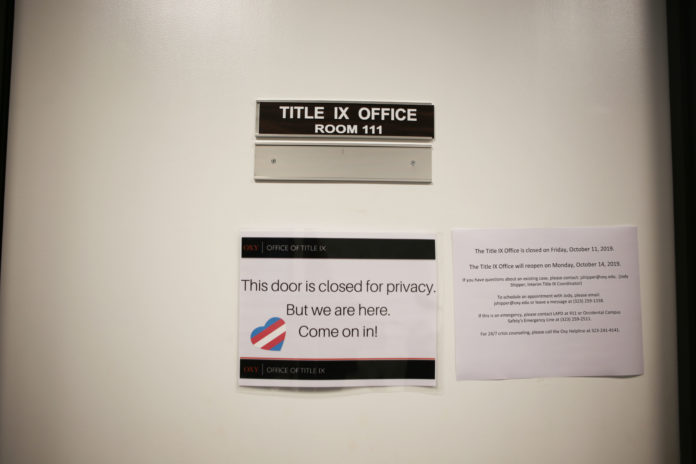
Politics department chair Thalia González hosted a public panel discussing restorative justice as a method to address campus sexual misconduct Oct. 10. Joining the panel via video chat were Kaaren Williamson, director of the Sexual Assault Prevention and Awareness Center at the University of Michigan, and Carrie Landrum, assistant director of Adaptable Resolution, Training & Strategic Partnerships at the University of Michigan. As of Jan. 1, 2019, the University of Michigan offers a restorative justice option for Title IX cases.
Senior manager of Project S.A.F.E. and survivor advocate Marianne Frapwell also joined the panel, sharing her knowledge of restorative justice. As of now, Occidental does not offer a restorative justice option when dealing with campus sexual misconduct.
There are efforts being made by various faculty, administrators and students within Occidental to create a permanent committee that would oversee the implementation of restorative justice into several different aspects of Occidental life. Frapwell said she sees restorative justice being used to deal with sexual misconduct as a future prospect at Occidental.
“I believe offering restorative options for sexual harm could be incredibly supportive for some students for whom their sense of justice and healing do not currently feel met by available systems,” Frapwell said.
Restorative justice for cases of sexual misconduct seeks to provide healing through a non-adversarial process.
“The goal of a restorative process is to address the harm that has been caused and work together to address the needs that have been created from that harm,” Frapwell said.
According to Williamson, at the University of Michigan, the restorative justice process can only be instigated by the claimant, not the respondent.
“Though restorative justice is a collaborative process, face-to-face contact is not necessary and neither is forgiveness,” Williamson said.
According to their website, The University of Michigan Office of Student Conflict Resolution offers five adaptable resolution options for a claimant to address a conflict using restorative justice. These options range from dialogue between the parties, both direct and indirect, to group conversations, all of which are facilitated by a staff member.
The goal of these processes is to reach an agreement between the claimant and respondent, referred to as an Adaptable Resolution Agreement. At the conclusion of the process when restorative justice is used to address campus sexual misconduct, the Title IX office at the university must approve all Adaptable Resolution Agreements.
Restorative justice at the University of Michigan also takes into account a survivor’s health and safety once the official process has ended. According to Williamson, survivors are encouraged to attend meetings and continue their journey of healing through the university’s various programs.
Williamson emphasized how restorative justice should not be confused with mediation, a process previously used to downplay instances of sexual misconduct on campus. The use of mediation on college campuses was forbidden following the 1972 passage of the education amendment: Title IX, which mandated that institutions had to treat instances of sexual misconduct as serious offenses. According to Frapwell, this practice had good intentions but took the power to control the situation away from the survivor.
Unlike a traditional disciplinary process, punishment is not actively sought during a restorative justice process.
“Perpetrators are asked to take accountability for their actions, take part in addressing the impact of their actions and change their behavior going forward,” Frapwell said.
According to Frapwell, the question of implementing restorative justice for sexual misconduct on Occidental’s Campus comes at a complex time, as other institutions around the country wait for the revised version of the U.S. Department of Education’s Dear Colleague Letter. The 2011 Dear Colleague Letter contained rules that spelled out how college campuses were to approach sexual misconduct cases. These rules were rescinded by Education Secretary Betsy DeVos in 2017. The Education Department issued interim guidelines, but as of Sept. 22, 2017 these guidelines have called for no changes in Occidental’s existing policies and procedures.
In addition, the Jan. 4 ruling of a state appellate court brought more changes to Title IX policies affecting public and private colleges in California. The ruling declared that in cases where credibility is an issue, a single-investigator process is unfair for the accused. In addition, the motion requires an adversarial process or live hearing. According to Frapwell, this allows for defense attorneys to question survivors and provide an advantage to parties that can afford legal aid.
Frapwell is the vice president for the new Title IX coordinator search committee. The job description lists knowledge of restorative justice models and policy as preferred experience.
President Johnathan Veitch announced Jody Shipper as Interim Title IX Coordinator in a campus wide email Oct. 10, in addition to the Title IX coordinator search committee. Shipper was previously the system-wide director of Title IX, Violence Against Women Act (VAWA), Clery Act and Sexual Violence/Sexual Assault (SVSA) compliance for the University of California system. Frapwell and CTSJ professor Heather Lukes are co-chairs of the committee, along with students, faculty and staff and administration.
![]()






























